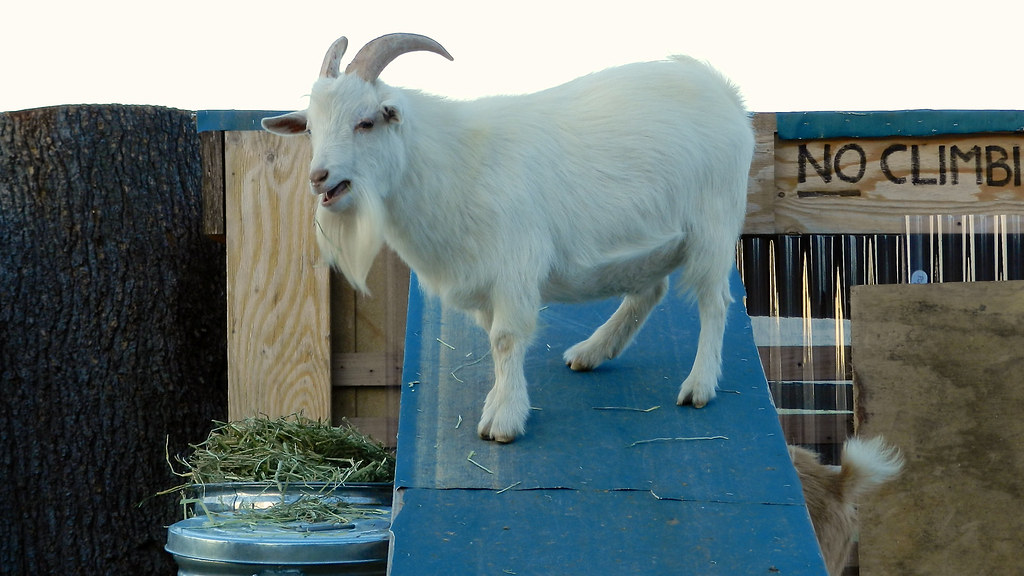
Twelve goats living in Portland's Central Eastside Industrial District will have to move out so a developer can break ground on a new apartment building.
Cassandra Profita
A dozen goats tromp around on their very own playground while traffic zooms by in Southeast Portland's industrial district.
Here, on the city's so-called "goat block," bike tours and families with children stop to visit the goat herd outside a chain-link fence. Each goat has a name and a "friendliness" rating posted outside the fence and once a day, a caretaker walks one of the friendly goats around the neighborhood for people to pet.
What started as a natural way to control the grass on a vacant lot – in keeping with a national trend of using urban goats for eco-friendly plant management – has turned into a sort of community petting zoo.
But all of this is coming to an end next month. The beloved goats are getting the boot as landowner and developer Killian Pacific plans to break ground next year on a new retail and apartment building at the site. The goats will have to go – but where?
Four people who have acted as caretakers to the goats teamed up and bought the herd in October. They want to make sure the goats can stay together after they're displaced.
Watch the video:
In the short term, they've arranged for the goats to move to a private farm outside of town. They're set to go sometime in December. But long term, the goats' owners are trying to figure out how to keep goats in the city so they can continue to interact with the people who have come to know and love them.
"The community has very personal relationships with the goats," said co-owner Jess Kurtz. "They know all their names, they know their personalities, and we want to keep that going as much as possible. ... We have all kinds of different types of people who come by. Some people – like myself before I got involved – just stand at the fence and admire that there’s a herd of goats in the middle of the city.”
Welcome to the "goat block."
Bret Walton, a manager at Killian Pacific, said his company had been planning to redevelop since 2002, when a fire leveled the building that was on the site. It wasn't until 2010 that the first goats were brought in to mow the grass.
"For a long time it was just a vacant lot, and I don’t know that anyone would pause and look at it twice walking by," Walton said.
It took a while for development plans to come together, he said, and bringing in goats to mow the grass in the meantime turned the lot into quite an attraction.
"We couldn't have imagined the reaction we would have received over the years," Walton said. "Now, quite honestly, if you refer to the goat block most people know exactly what you're talking about."
Chester is a four out of five on the friendliness scale.
The goats' owners are planning to start a nonprofit organization so they can raise money and secure another urban home for the goats.
But finding the right place isn't easy, Kurtz said. They need a site with enough land for the goats that will also be available for an extended period of time.
"We've had a lot of people offer us land out of city limits and in rural areas which is great, and it's awesome to know that the community supports us so much, but we do want to find something a little bit more public," she said. "We can get on with developing companies all over the place, but the land may be contaminated or it may only be available for three to six months."
Kurtz said there are no hard feelings between the goats' owners and the developers because development was expected.
"We’re definitely sad to see them leave this part of the community and this piece of land they’ve been on for a year," she said. "But at the same time we’re very optimistic about their future and a more permanent home."



